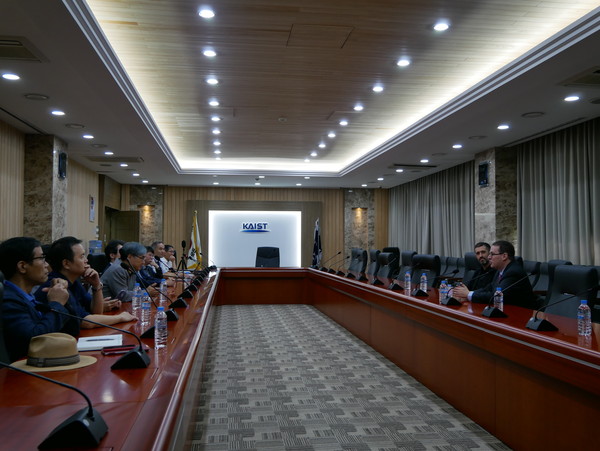We have all heard about innovative solutions to uninspiring classroom lectures and shorter-than-goldfish-attention spans. 21st century education models are being grafted into existing university programs, with the hopes of adapting to new technologies and the changing job landscape. The Minerva Schools at KGI aim not only to incorporate new learning techniques into existing curriculums, but to address the fundamental problems of higher education. At the heart of the Minerva Project is the concept of transference, which simply means being able to use what you’ve learned and apply it in a variety of contexts effectively — something most people cannot learn in a traditional classroom setting. The KAIST Herald had the opportunity to talk to Ben Nelson, founder and CEO of the Minerva Project, about how Minerva started and what their ultimate goal is.
Please briefly describe Minerva University.
The Minerva Schools at KGI are designed to implement a new kind of education, that has, at its core, an idea of a scaffolded education — which means that we teach a set of general education principles in the first year, and then those principles get interleaved in all of the upper level courses as students go through it. Minerva is [a] very small university — we only have about 150 students every year. The students [spend a total of] four years in seven countries.

One of the main goals of Minerva University is to redefine the education system for the 21st century. You mentioned that you came up with this system 26 years ago, at a time when the technology wasn’t even available. How did you establish a whole university system in such a short period of time?
I spent four years as an undergraduate thinking through the curriculum. Before I thought of creating a new institution, [it was just] a way to reform the university I went to. But Ivy League universities don’t really want to reform. When a student says, “Let’s do something better”, even though almost everybody agreed that it was better than what we were doing, there really was no desire to focus on the problems [in] institutions of higher education. And so, I took a break; I graduated, I went into the working world, and I saw how you can take an idea and grow it into a major successful enterprise even though you were facing incumbents that were a hundred years old or more. That’s when I [realized] you really can do this where it matters, and that’s when I started working on Minerva as what it is today.
What would you say is the biggest challenge that you encountered in developing and launching the program that you envisioned?
The biggest challenge was at the very beginning, which is to even raise the money to get off the ground. When you go to somebody and say, “I want to start the world’s greatest university from scratch”, that doesn’t sound realistic. And when you say, “By the way, the real goal of this university is then to transform the education [system] of every other university in the world”, that sounds even more absurd. And so, it was really a long time before I could get the plan to a point of detail and specificity and find forward-thinking enough investors. That took almost two years.
What are your hopes for the exportation of this curriculum to other universities?
Our ultimate goal is that every university in the world will have its own philosophy on what its graduates should be good at. One university will be able to tell you, as many do, “We will teach you how to think critically.” Well, rather than just saying it, they would actually implement that into their educational program. They’ll be able to measure how good of a critical thinker you are [at the start and track your progress], and at the end, actually demonstrate that all of their graduates have attained critical thinking skills by the time they graduate.
How would the Minerva curriculum be adaptable to a science and engineering university such as KAIST, especially with concerns about the need for more specialized courses rather than a generalized curriculum?
A great deal of our students at the Minerva Schools major in Natural and Computational Sciences, so no adapting is needed. Foundational cognitive skills are crucial no matter what is studied and they only take up one of the four years at Minerva, which means that any school can utilize our system both for general education as well as subject specific courses later on.
What is your advice to students who want a better and more engaging learning model, but currently have no access to it?
This is perhaps the hardest part. Too often what students learn seems irrelevant to their own lives and they give up trying to make it relevant. What students should be doing is thinking hard about how to draw lessons from what they learn that they can then apply elsewhere. Think through the underlying ideas — not just the material you are told to memorize — and figure out how they can be broadly applied. This is of course easier said than done, which is why a Minerva education is so crucial. It is also why Minerva offers a Master’s degree in Decision Analyses for those students who did not receive this kind of thinking [education] as undergraduates.

